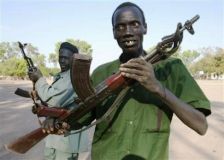Red Cross: Sudan media wrongly reported prisoner release
By MOHAMED OSMAN, Associated Press Writer
KHARTOUM, Sudan, Feb 17, 2005 (AP) — The Red Cross has criticized what it called inaccurate reporting by Sudanese media that forecast the imminent release of soldiers captured by southern rebels, saying its offices have been inundated by relatives expecting to see their loved ones.

|
|
Members of the New Sudan Police practice a drill , Tuesday, Jan. 18, 2005 in Rumbek in southern Sudan. (AP). |
Local newspapers and the official Sudan News Agency, SUNA, reported that some 700 prisoners of war would be released this week by the southern rebels, the Sudan People Liberation Army or SPLA.
“This imprecise information has caused unnecessary distress and frustration for many families whose hopes have been falsely raised due to these unfounded media reports,” the Khartoum offices of the International Committee of the Red Cross said in a statement.
Red Cross spokeswoman Lorena Brander Bastias said relatives of the captured soldiers had been coming to the offices “from all parts of the Sudan.” She declined to give a number.
“These families are understandably anxious to be reunited with their loved ones,” the ICRC statement added.
On Monday the ICRC announced that it and the Sudanese government had signed a memorandum of understanding concerning the expected release of soldiers held by the SPLA, which signed a comprehensive peace accord with the government last month.
The SPLA has not yet signed the memorandum, and no date for the release has been agreed.
Monday’s announcement gave no figure for the number of prisoners held by the rebels, but the minister of state for foreign affairs, Najeeb al-Khair Abdel-Wahab, told SUNA “the available information we have indicate there are about 700 of them.”
On Thursday, the ICRC urged local media to be sensitive to the feelings of the captives’ families and to bear in mind that “the responsibility for carrying out the release, including the timing and place of the transfer, remains fully with the (government and SPLA) and not with the ICRC.”
The SPLA took up arms against the government in 1983, fighting for autonomy and democratic rule in southern Sudan. It drew support from the south’s Christian and animist people, who resented the rule of the Muslim-dominated government in Khartoum. The conflict also involved a contest for resources as Sudan’s oil fields straddle the border between the northern and southern provinces.
